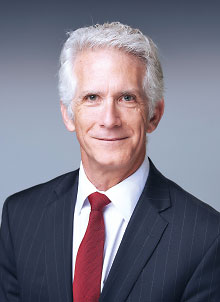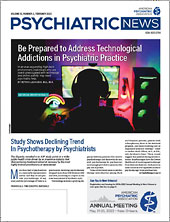More than half of psychiatrists in a nationally representative survey said they do not provide psychotherapy of any kind, and the percentage of visits to a psychiatrist involving psychotherapy dropped more than 50% between 1996 and 2016, according to a report in the American Journal of Psychiatry (AJP).
The findings indicate a growing disparity between patients who receive psychotherapy and those who do not, with psychotherapy by psychiatrists increasingly provided to patients who pay out of pocket.
“Some of the lowest rates in psychotherapy were observed among Black and Hispanic patients, patients with schizophrenia, those in the Medicaid program, and those receiving care in organized practice settings,” study co-author Mark Olfson, M.D., M.P.H., told Psychiatric News. “These trends suggest that patients facing socioeconomic disadvantages have the lowest likelihood of receiving psychotherapy from their psychiatrists. Such patterns raise concerns over equitable access to psychotherapy from psychiatrists.
“By contrast, White patients, self-pay patients, those with personality disorders, and those who received care in office settings had some of the strongest correlations with receiving psychotherapy.”
APA Area 4 Trustee Eric Plakun, M.D., a founding member of the APA Caucus on Psychotherapy, said the disparity revealed in the study points to a wider public health crisis driven by an insurance industry that disincentivizes treatment aimed at recovery by the most highly trained practitioners and instead has been focused on mere crisis stabilization. He noted that this includes psychotherapy in general and its provision by psychiatrists.
“This is another example of something quite shameful—the best treatment goes to people with the most money and the most privilege.”
He is medical director and CEO of the Austen Riggs Center.
He added, “The reason psychiatrists [providing psychotherapy] often operate outside of insurance is because the insurance-based reimbursement system underpays psychiatrists compared with other physicians providing comparable services and generally limits treatment to crisis stabilization,” Plakun said in an interview. “I did not need four years of residency to learn how to do crisis stabilization. That is a much narrower goal than recovery. Helping patients achieve recovery is what I learned, and it’s why I also pursued psychoanalytic training. I wanted to help people lead self-directed lives by coming to grips with their strengths and limitations, not just suppressing a symptom or handling a crisis.
“The message in this study isn’t just about psychiatrists and psychotherapy—this is about a mental health crisis in America.”
Robert Trestman, M.D., chair of the APA Council on Healthcare Systems and Financing, said the study results challenge psychiatry to confront questions about its identity. “Olfson’s work is extremely important to help us think about a key issue,” he said. “What does it mean to be a psychiatrist in the 21st century? What distinguishes us from social workers, psychologists, nurse practitioners?” (See box.)
Olfson and Daniel Tadmon, M.Phil., a Ph.D. student in the Department of Sociology at Columbia University, analyzed 21 years of data collected by the U.S. National Ambulatory Medical Care Survey (NAMCS) between January 1996 and December 2016. Each year, the Centers for Disease Control and Prevention’s National Center for Health Statistics fields a nationally representative sample of outpatient visits to physician practices that are not hospital based and not federally funded. Only visits in which patients saw a psychiatrist were included.
The main outcome variable was whether psychotherapy was provided. NAMCS defines psychotherapy as “all treatments involving the intentional use of verbal techniques to explore or alter the patient’s emotional life in order to effect symptom reduction or behavior change.” This definition was refined to apply only to visits longer than 30 minutes.
The overall sampled number of psychiatrist visits was 29,673, representing about 26 million national visits yearly. Rates of psychotherapy were analyzed across 12 diagnostic categories. Olfson and Tadmon also looked at psychotherapy by patient sociodemographic characteristics including age, gender, race/ethnicity, source of payment, office setting in which visits occurred, and geographic location.
They found that between 1996 and 2016, the weighted percentage of visits involving psychotherapy declined significantly from 44.4% in 1996-1997 to 21.6% in 2015-2016.
Across the study years, the percentage of psychiatrists providing no psychotherapy in any visit significantly increased. Between 1996 and 2002, 133 of 491 (27%) sampled psychiatrists provided no psychotherapy; between 2003 and 2009, 189 of 547 (35%) provided no psychotherapy; and between 2010 and 2016, 355 of 673 (53%) provided no psychotherapy.
Other findings include the following:
•
Visits by patients who were under age 25, visits by patients who identified as Black or Hispanic, and visits in which any class of psychotropic medication was prescribed were less likely to involve psychotherapy.
•
Compared with private insurance, Medicare and Medicaid visits were less likely to involve psychotherapy. Self-pay visits were more likely to involve psychotherapy.
•
Visits to psychiatrists in group practices and HMOs or other settings involved psychotherapy less frequently compared with those in solo practices.
•
While psychiatric comorbidity was not associated with psychotherapy provision, a diagnosis of dysthymic disorder, obsessive-compulsive disorder, other anxiety disorders, or personality disorders involved psychotherapy more often than other diagnoses, and a diagnosis of major depressive disorder, bipolar disorder, panic disorder, or schizophrenia involved psychotherapy less often.
Olfson told Psychiatric News that the study did not look at the length of time in practice as a correlate of psychotherapy. “However, it would be my guess that older psychiatrists trained in an era when psychotherapy was more central to psychiatric practice are more extensively engaged in providing psychotherapy than are their younger and more recently trained colleagues,” he said. “One of my concerns is that some younger psychiatrists may not receive adequate training in evidence-based psychotherapy, and their practice may be structured in such a way that they have few opportunities to develop and refine these skills.”
He said this shift in clinical activities risks narrowing the scope of practice of psychiatry to symptom management and not devoting sufficient clinical attention to problems patients face in their personal relations, families, and work roles. “As part of a broader drive toward specialization in medical practice, there are real risks that mental health care for many patients has become fragmented between providers, and that truly integrated care may be becoming a luxury affordable only to those with the means to pay out of pocket,” Olfson said.
Plakun was an expert witness in the landmark
Wit v. UBH case. In November 2020, Judge Joseph Spero of the United States District Court for the Northern District of California ruled that the nation’s largest managed behavioral health organization had improperly denied thousands of claims for treatment of mental and substance use disorders. UBH was ordered to use medical necessity criteria and assessment tools developed by nonprofit mental and substance use disorder specialty organizations when making coverage-related determinations. The ruling highlighted eight elements of effective treatment aimed at recovery (
Psychiatric News).
UBH has appealed the ruling, and APA filed an amicus brief supporting the injunction by Spero.
“Our work now is to extend the elements of effective treatment beyond UBH to all ERISA plans, to commercial insurance, Affordable Care Act plans, Medicare, and Medicaid,” Plakun told Psychiatric News. “When one standard governs medical necessity determinations for access to care, those on Medicare and Medicaid will get treatment comparable to those with better insurance or operating out of insurance plans. This is one way forward toward reducing health disparities.”
Plakun urged APA members to join the APA Caucus on Psychotherapy, which now has 1,200 members. “I know that I am operating at the top of my license when I offer both medication and psychotherapy,” he said. “No other discipline has the training and expertise to provide this kind of integrated treatment as competently as we can.” ■
“Trends in Outpatient Psychotherapy Provision by Psychiatrists: 1996-2016” is posted
here. APA members who wish to join the Caucus on Psychotherapy may do so
here.

